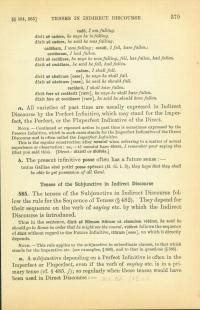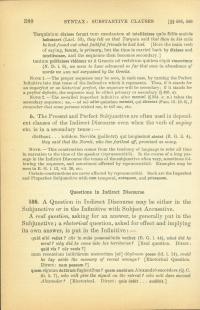585. The tenses of the Subjunctive in Indirect Discourse follow the rule for the Sequence of Tenses (§ 482). They depend for their sequence on the verb of saying, etc., by which the Indirect Discourse is introduced. Thus in the sentence, dīxit sē Rōmam itūrum ut cōnsulem vidēret (He said he should go to Rome in order that he might see the consul), vidēret follows the sequence of dīxit without regard to the Future Infinitive, itūrum [esse], on which it directly depends.
Note— This rule applies to the Subjunctive in subordinate clauses, to that which stands for the imperative, etc., (see examples, § 588), and to that in questions (§ 586).
a. A Subjunctive depending on a Perfect Infinitive is often in the Imperfect or Pluperfect, even if the verb of saying, etc., is in a primary tense (cf. § 485.j); so regularly when these tenses would have been used in Direct Discourse.
Tarquinium dīxisse ferunt tum exsulantem sē intellēxisse quōs fīdōs amīcōs habuisset (Lael. 53) They tell us that Tarquin said that then in his exile he had found out what faithful friends he had had. [Here the main verb of saying, ferunt, is primary, but the time is carried back by dīxisse and intellēxisse, and the sequence then becomes secondary.]
tantum prōfēcisse vidēmur ut ā Graecīs nē verbōrum quidem cōpiā vincerēmur. (N. D. 1.8) We seem to have advanced so far that even in abundance of words we ARE not surpassed by the Greeks.
Note 1— The proper sequence may be seen, in each case, by turning the Perfect Infinitive into that tense of the Indicative which it represents. Thus, if it stands for an Imperfect or an Historical Perfect, the sequence will be secondary; if it stands for a Perfect Definite, the sequence may be either primary or secondary (§ 485.a).
Note 2— The so-called Imperfect Infinitive after meminī (§ 584.a, Note) takes the secondary sequence.
Ad mē adīre quōsdam meminī, quī dīcerent, etc. (Fam. 3.10.6) I remember that some persons visited me, to tell me, etc.
b. The Present and Perfect Subjunctive are often used in dependent clauses of the Indirect Discourse even when the verb of saying etc. is in a secondary tense.
dīcēbant . . . totidem Nerviōs (pollicērī) quī longissimē absint. (B. G. 2.4) They said that the Nervii, who live farthest off, promised as many.
Note— This construction comes from the tendency of language to refer all time in narration to the time of the speaker (repraesentātiō). In the course of a long passage in the Indirect Discourse the tenses of the subjunctive often vary, sometimes following the sequence, and sometimes affected by repraesentātiō. Examples may be seen in B. G. 1.13, 7.20, etc.
Certain constructions are never affected by repraesentātiō. Such are the Imperfect and Pluperfect Subjunctive with cum temporal, antequam, and priusquam.


